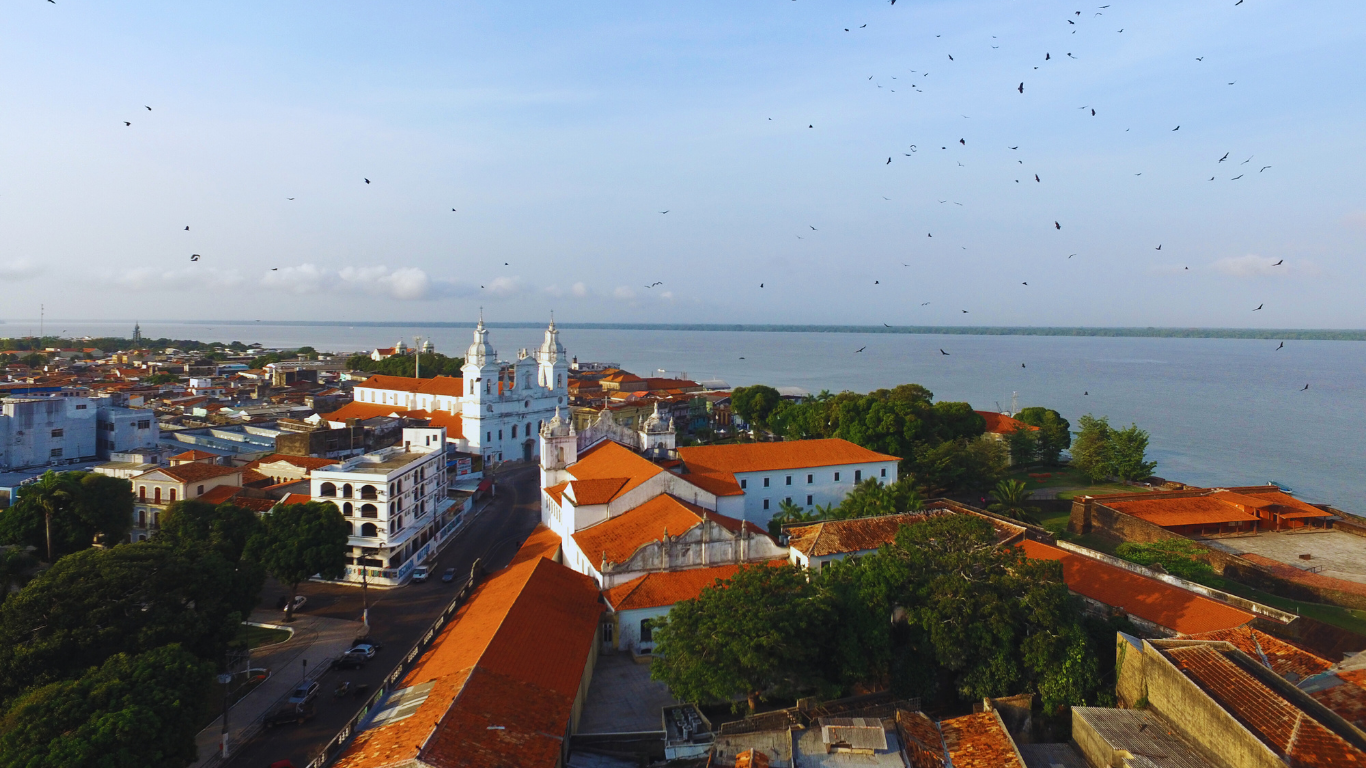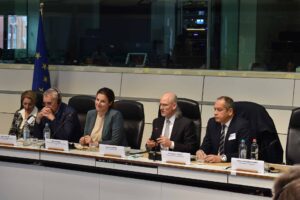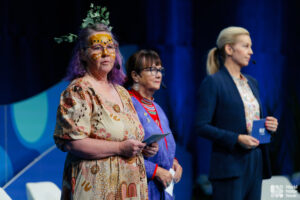- SIWI – Leading expert in water governance
- /
- Latest
- /
- Water at the heart of climate action: SIWI shapes the future of the GCAA
Water at the heart of climate action: SIWI shapes the future of the GCAA

Water must be recognized as a foundation of effective climate action. That is the message we, together with our partners, sent to the UN Climate Champions as they shape the next five-year vision for the Global Climate Action Agenda (GCAA). We emphasized that water action led by communities, civil society, and other organizations can inform the decisions governments take at UN climate talks. The Global Stocktake guides future priorities, while the Global Climate Action Agenda acts as a bridge between governments and other actors, making water resilience a core element of global climate progress.
Tackling the climate crisis requires the combined efforts of governments and a wide range of non-state actors whose innovation, resources, and influence are essential to accelerating global action. With implementation at the heart of this year’s COP30 in Belém, partnerships are more critical than ever. Since the Paris Agreement in 2015, the Global Climate Action Agenda (GCAA) has provided a framework for non-governmental actors to contribute to climate solutions alongside countries. Coordinated through the UN Climate Champions and the Marrakech Partnership, the GCAA has become a key platform to showcase action and drive collaboration.
In 2025, the Climate Champions launched a consultation on the GCAA’s next five-year vision, aiming to make it more impactful, inclusive, and accountable in the run-up to COP30 in Belém and beyond. SIWI, as part of the Marrakech Partnership’s Water Content Group, co-authored a detailed submission with the Alliance for Global Water Adaptation (AGWA), the International Network of Basin Organizations (INBO), and the International Water Management Institute (IWMI), showing why water must be central to global climate action.
Why water belongs in the Action Agenda
Water underpins almost every aspect of climate action. It powers clean energy transitions, secures food systems, sustains ecosystems, and helps communities withstand climate shocks. Yet water has often been treated as secondary rather than as the thread connecting all sectors. We argued that this must change if the Paris Agreement’s goals are to be met.
Anchoring water in climate governance
One of SIWI’s key recommendations is to put water at the heart of the Global Stocktake (GST) – the Paris Agreement’s main progress review. Every five years, governments assess collective progress and update their national plans. The first GST, concluded at COP28 in Dubai, already recognized the importance of water and freshwater ecosystems.
Anchoring the GCAA in the GST would ensure that the actions of cities, businesses, and civil society are tracked alongside governments, creating a more complete picture of climate progress. It would also move beyond a “COP-to-COP” cycle of new initiatives, making climate action more continuous and accountable. This approach ensures water is treated not as a side issue but as a foundation of resilience across all sectors, while aligning non-government commitments with national climate plans. This call was later echoed in the official UNFCCC synthesis report, which stressed that success for the GCAA should be judged by its contribution to the GST.
Improving accountability and continuity
We are also calling for practical tools to make climate action more transparent. One idea is a dedicated water section in the Global Climate Action Portal, the UNFCCC’s platform for tracking commitments, showing pledges and progress from governments, cities, companies, and civil society in one place. It would use common indicators such as the resilience of water and sanitation systems, the restoration of freshwater ecosystems, and investments in water-smart energy transitions. With this approach, it becomes easier to see what has been achieved and where the biggest gaps remain.
We also recommend including water-specific indicators in the Yearbook of Global Climate Action, the UNFCCC’s annual report on climate progress. Adding measures such as climate-resilient WASH, nature-based water solutions, and freshwater ecosystem health would show how water action contributes alongside emissions reductions.
Equally important is continuity. Too many initiatives are launched at one COP and forgotten by the next. SIWI pointed to the Water for Climate Pavilion – coordinated with more than 90 partners – as living proof that water can have a consistent, visible presence across climate conferences. Linked with the Baku Dialogue on Water for Climate Action, the Pavilion shows how water can move from being a side event to a permanent part of the UNFCCC process, ensuring momentum builds year after year.
Promoting inclusive and effective governance
True water governance must be inclusive. SIWI and its partners recommend that Indigenous Peoples, youth, and marginalized communities not just be invited but given formal roles in the Marrakech Partnership’s water workstreams, with their contributions feeding directly into official UN climate bodies. We also call for stronger connections across sectors and regions, grounded in rights-based approaches, including recognition of customary and Indigenous water rights, to ensure climate solutions are both effective and fair.
SIWI as a bridge-builder
Going forward, one of the most important tasks will be to close the gap between governments and non-governmental actors who can help turn commitments into action. The GCAA must create spaces where governments and other actors can work together. New national climate plans should draw on the experience of Indigenous Peoples, cities, utilities, businesses, and civil society. Together with partners, SIWI will continue creating platforms like the Water for Climate Pavilion to ensure that local expertise and innovative solutions inform global decisions and keep policy connected to realities on the ground.
Looking ahead
The consultation on the GCAA’s five-year vision will shape how global climate action is organized in the years ahead. With COP30 approaching, the next phase of the Action Agenda will need to be more inclusive, accountable, and resilient. Together with partners, SIWI will work to ensure that water is at the heart of this vision – not as a side issue, but as a foundation of effective climate solutions. The strong alignment between our input and the UNFCCC synthesis findings shows that momentum for water in climate governance is growing stronger than ever.
Most recent

Why climate action must integrate water
- Water and climate
- World Water Week
- Water governance

Swedish Water House Trendspotting 2026
- Swedish Water House

SIWI Reflections 2025: When Indigenous voices shape global water dialogue
- World Water Week
- Indigenous knowledge

SIWI Reflections 2025: When knowledge begins to travel
- Water diplomacy
- Water cooperation
- Water and Peace

SIWI joins Wallenberg-funded forest resilience research



